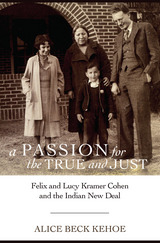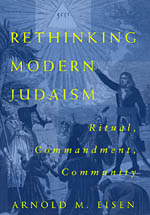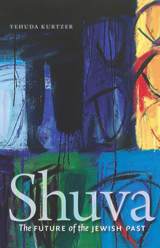3 books about Commandments (Judaism)

A Passion for the True and Just
Felix and Lucy Kramer Cohen and the Indian New Deal
Alice Beck Kehoe
University of Arizona Press, 2014
Felix Cohen, the lawyer and scholar who wrote TheHandbook of Federal Indian Law (1942), was enormously influential in American Indian policy making. Yet histories of the Indian New Deal, a 1934 program of Franklin D. Roosevelt’s New Deal, neglect Cohen and instead focus on John Collier, commissioner of Indian affairs within the Department of the Interior (DOI). Alice Beck Kehoe examines why Cohen, who, as DOI assistant solicitor, wrote the legislation for the Indian Reorganization Act (1934) and Indian Claims Commission Act (1946), has received less attention. Even more neglected was the contribution that Cohen’s wife, Lucy Kramer Cohen, an anthropologist trained by Franz Boas, made to the process.
Kehoe argues that, due to anti-Semitism in 1930s America, Cohen could not speak for his legislation before Congress, and that Collier, an upper-class WASP, became the spokesman as well as the administrator. According to the author, historians of the Indian New Deal have not given due weight to Cohen’s work, nor have they recognized its foundation in his liberal secular Jewish culture. Both Felix and Lucy Cohen shared a belief in the moral duty of mitzvah, creating a commitment to the “true and the just” that was rooted in their Jewish intellectual and moral heritage, and their Social Democrat principles.
A Passion for the True and Just takes a fresh look at the Indian New Deal and the radical reversal of US Indian policies it caused, moving from ethnocide to retention of Indian homelands. Shifting attention to the Jewish tradition of moral obligation that served as a foundation for Felix and Lucy Kramer Cohen (and her professor Franz Boas), the book discusses Cohen’s landmark contributions to the principle of sovereignty that so significantly influenced American legal philosophy.
Kehoe argues that, due to anti-Semitism in 1930s America, Cohen could not speak for his legislation before Congress, and that Collier, an upper-class WASP, became the spokesman as well as the administrator. According to the author, historians of the Indian New Deal have not given due weight to Cohen’s work, nor have they recognized its foundation in his liberal secular Jewish culture. Both Felix and Lucy Cohen shared a belief in the moral duty of mitzvah, creating a commitment to the “true and the just” that was rooted in their Jewish intellectual and moral heritage, and their Social Democrat principles.
A Passion for the True and Just takes a fresh look at the Indian New Deal and the radical reversal of US Indian policies it caused, moving from ethnocide to retention of Indian homelands. Shifting attention to the Jewish tradition of moral obligation that served as a foundation for Felix and Lucy Kramer Cohen (and her professor Franz Boas), the book discusses Cohen’s landmark contributions to the principle of sovereignty that so significantly influenced American legal philosophy.
[more]

Rethinking Modern Judaism
Ritual, Commandment, Community
Arnold M. Eisen
University of Chicago Press, 1998
Arnold Eisen here calls for a fundamental rethinking of the story of modern Judaism. More than simply a study of Jewish thought on customs and rituals, Rethinking Modern Judaism explores the central role that practice plays in Judaism's encounter with modernity.
"Fascinating . . . an insightful entrance point to understanding the evolution of the theologies of America's largest Jewish denominations."—Tikkun
"I know of no other treatment of these issues that matches Eisen's talents for synthesizing a wide variety of historical, philosophical, and social scientific sources, and bringing them to bear in a balanced and open-minded way on the delicate questions of why modern Jews relate as they do to the practices of Judaism."—Joseph Reimer, Boston Book Review
"At once an incisive survey of modern Jewish thought and an inquiry into how Jews actually live their religious lives, Mr. Eisen's book is an invaluable addition to the study of American Judaism."—Elliott Abrams, Washington Times
"Fascinating . . . an insightful entrance point to understanding the evolution of the theologies of America's largest Jewish denominations."—Tikkun
"I know of no other treatment of these issues that matches Eisen's talents for synthesizing a wide variety of historical, philosophical, and social scientific sources, and bringing them to bear in a balanced and open-minded way on the delicate questions of why modern Jews relate as they do to the practices of Judaism."—Joseph Reimer, Boston Book Review
"At once an incisive survey of modern Jewish thought and an inquiry into how Jews actually live their religious lives, Mr. Eisen's book is an invaluable addition to the study of American Judaism."—Elliott Abrams, Washington Times
[more]

Shuva
The Future of the Jewish Past
Yehuda Kurtzer
Brandeis University Press, 2012
Modern Jews tend to relate to the past through “history,” which relies on empirical demonstration and rational thought, rather than through “memory,” which relies on the non-rational architectures of mythology. By now “history” has surpassed “memory” as a means of relating to the past—a development that falls short in building identity and creates disconnection between Jews and their collective history. Kurtzer seeks to mend this breach. Drawing on key classical texts, he shows that “history” and “memory” are not exclusive and that the perceived dissonance between them can be healed by a selective reclamation of the past and a translation of that past into purposefulness.
[more]
READERS
Browse our collection.
PUBLISHERS
See BiblioVault's publisher services.
STUDENT SERVICES
Files for college accessibility offices.
UChicago Accessibility Resources
home | accessibility | search | about | contact us
BiblioVault ® 2001 - 2024
The University of Chicago Press









